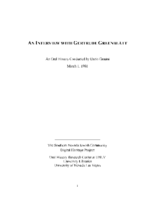Search the Special Collections and Archives Portal
Search Results
Lois Bell oral history interview
Identifier
Abstract
Oral history interview with Lois Bell conducted by Sam Cusimano on unknown date for the Ralph Roske Oral History Project on Early Las Vegas. Bell discusses her time as a cocktail waitress in various casinos, including her experiences of waiting on various celebrities. Bell also describes the changes of the Las Vegas Strip, her account of witnessing atomic testing events, and her position at Roxie’s, a brothel that existed during the early days of Las Vegas, Nevada.
Archival Collection
Richard Rizzo oral history interview
Identifier
Abstract
Oral history interview with Richard "Dick" Rizzo conducted by Stefani Evans on October 18, 2017 for the Building Las Vegas Oral History Project. In this interview, Rizzo discusses his early life in Massachusetts and initial interest in construction. He remembers moving to Arizona to join Tutor Perini Building Corporation in 1977, the company’s first Las Vegas, Nevada project, and their company’s decision to move to Las Vegas in 1980. Rizzo talks about the company's public image, building CityCenter, and the importance of maintaining professional relationships with all members in a building project. Later, Rizzo recalls the making of the book
Archival Collection
The Church of Jesus Christ of Latter-day Saints, Highland Hills Local Unit Recreation Facility, 2003 February 18; 2004 March 9
Level of Description
Archival Collection
Collection Name: Alton Dean Jensen Architectural Records
Box/Folder: Roll 223
Archival Component

Transcript of interview with Gertrude Greenblatt by Dario Gratini, March 1, 1981
Date
Archival Collection
Description
Interview with Gertrude Greenblatt by Dario Gratini on March 1, 1981. In this interview Greenblatt talks about arriving in Las Vegas in the 1940s, and the changes that took place place such as population growth, price increases, employment requirements, and recreation. She also talks about the changes in utilities and environmental issues.
Text
Lucille Matyas oral history interviews
Identifier
Abstract
Oral history interviews with Lucille Matyas conducted by Irene Rostine on November 18, 2010 and December 02, 2010 for the Women's Research Institute of Nevada (WRIN) Las Vegas Women Oral History Project. Matyas opens her interview by discussing her family's move to Las Vegas, Nevada and her mother's turbulent marriage to a Las Vegas constable in 1935. She then describes working at the phone company after school to avoid the dangers of her home life. She discusses learning to repair switchboards, saving equipment parts during wartime rationing, and listening in to the private conversations of repairmen. Matyas then describes family gatherings in Ohio before her family's move to Nevada. She later returns to talking about working at the telephone company and describes the issues customers had with party lines and the lack of telephone lines to serve the growing population of Las Vegas. Matyas ends her interviews discussing other memorable experiences she had working at the telephone company.
Archival Collection

Boom days in Tonopah: photographic print
Date
Archival Collection
Description
Image
Sherrill L. Ware oral history interview
Identifier
Abstract
Oral history interview with Sherrill L. Ware conducted by Lawrence R. Gross on March 18, 1978 for the Ralph Roske Oral History Project on Early Las Vegas. Ware begins by discussing his service in the United States Navy stationed at Lake Mead before working as a gun manufacturer in Henderson, Nevada. He describes his experience with firearms, including participating in shooting competitions and hunting. Ware talks about life in Las Vegas, Nevada, how the city changed over time, and his career as an operating engineer. Ware also talks about labor unions and the difficulties they face from the companies they worked within, as well as mining in Nevada.
Archival Collection
Nanyu Tomiyasu oral history interviews
Identifier
Abstract
Oral history interviews with Nanyu Tomiyasu conducted by Robert McCracken on January 18, 2000, February 05, 2000 and April 02, 2000 for the Women's Research Institute of Nevada (WRIN) on behalf of the Tule Springs Preservation Committee. Tomiyasu opens his interview by discussing his father's immigration journey from Japan to Las Vegas, Nevada. Tomiyasu then describes his father's career in Las Vegas as a vegetable farmer. He talks about the process and challenges his father faced as a farmer in Nevada, and the techniques he used to maintain his land. Tomiyasu then discusses taking over his father's farm, racial discrimination the family faced, and the farm's purchasing agreements with local grocery stores. He also talks about the water systems his farm and the surrounding area relied on, as well as the animals that lived in the area. Tomiyasu ends his interview by discussing his mother's life story and his wife and children.
Archival Collection

Transcript of interview with Edward Gregory by Jonathan Bellingar, March 2, 1977
Date
Archival Collection
Description
On March 2, 1977, Jonathan R. Bellingar interviewed Edward Gregory (born July 28, 1922) about his life in Nevada. The interview takes place at Nellis Air force Base; also present during the interview is an unidentified man. Gregory was born and raised in Nevada; he discusses leaving Nevada to serve in the Army during World War II before eventually returning to Nevada in 1950. The interview concludes with a brief overview of how Nellis Air force Base has changed since the 1950s.
Text

Transcript of interview with Bud Weil by Claytee White, December 9, 2003
Date
Archival Collection
Description
Bud Weil worked as a disc jockey in Mexico after serving in the military during World War II. In 1947, he moved to Las Vegas to work at KLAS but after two days he was job hunting. His search landed him at KENO, a radio station owned by Max and Laura Belle Kelch. His was an interview show that afforded him entree to stars performing in town. The list of his favorite interviews includes Sophie Tucker, Sammy Davis, Jack Benny, The Mills Brother, Rosemary Clooney, Leno Home, Joey Lewis and many others. In 1955, he became restless, left the career in broadcasting, and joined Max Kelch as a partner in a new venture for Las Vegas - Musak. This enterprise took him to the doors of every business in town and shortly, he knew everybody. He uses that knowledge in this interview to talk about all aspects of life as the town grew over the years. Today he is a senior statesman of our town, enjoying everything about Las Vegas except the traffic.
Text
